| Srl | Item |
| 1 |
ID:
149456
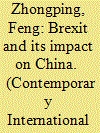

|
|
|
|
|
| Summary/Abstract |
The unexpected outcome of the Brexit referendum caught Britain, Europe and the world off guard. Despite the possibility that Britain might hinder the process via certain measures, we can now say that the Britain-EU divorce is inevitable. In the wake of the shock, people have reflected on how Brexit was able to happen and what will be the consequences. This paper seeks to explore these issues.
|
|
|
|
|
|
|
|
|
|
|
|
|
|
|
|
| 2 |
ID:
160618
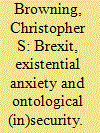

|
|
|
|
|
| Summary/Abstract |
This article explores how the Brexit Referendum on the UK's membership of the European Union has been a source of destabilisation, dread and ontological anxiety. Focusing mainly on British citizens who voted or self-identified as “Remainers”, and on EU foreign nationals resident in the UK, it shows how existential anxieties have had different points of focus for different groups of people. Confronted with such destabilising anxieties, the article shows how people have adopted different mechanisms designed to reassert a sense of order and certitude often viewed as central to preserving ontological security. The ways in which this has been done, however, can themselves raise important questions.
|
|
|
|
|
|
|
|
|
|
|
|
|
|
|
|
| 3 |
ID:
162593
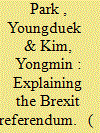

|
|
|
|
|
| Summary/Abstract |
On 23 June 2016, the UK's ‘Brexit’ referendum saw a majority vote to leave the EU—a result that shocked the world. Using European Social Survey data, we argue that Brexit was not simply decided by less‐educated voters who did not understand the EU's value. Pro‐Brexit votes were determined by economic interests as well as emotional, psychological, and attitudinal factors related to European integration. We demonstrate that skill level played a more important role in voter decision than education, gender, age, and political stance.
|
|
|
|
|
|
|
|
|
|
|
|
|
|
|
|
| 4 |
ID:
144834
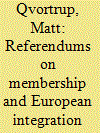

|
|
|
|
|
| Summary/Abstract |
There are many myths about referendums. The most common one is that voters are inherently sceptical and tend to vote no when given the opportunity. This article analyses some of the commonly held ‘truths’ about referendums on EU matters. Based on a statistical analysis of all forty-three EU-related referendums since 1972, it shows that governments tend to lose referendums if they have been in office for a long time, that emotive words on the ballot paper are correlated with a high yes vote and that a high turnout is correlated with a vote against European integration, but campaign spending is inconsequential. Based solely on statistical evidence from the previous forty-three referendums, the opponents of EU membership will win the Brexit referendum.
|
|
|
|
|
|
|
|
|
|
|
|
|
|
|
|
| 5 |
ID:
169180
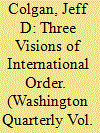

|
|
|
| 6 |
ID:
145559
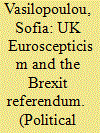

|
|
|
|
|
| Summary/Abstract |
This article shows that key to understanding the referendum outcome are factors such as a profoundly eurosceptic public, high levels of citizen uncertainty, divided mainstream political parties on the EU and lack of unity within the ‘Leave’ campaign. The Brexit referendum is more than just about domestic issues and government approval. Utilitarian concerns related to economic evaluations of EU integration coupled with support of or opposition to EU freedom of movement are very likely to influence vote choice. Those campaigns that focus on rational utilitarian arguments about the costs and benefits related to EU membership as a whole but also to EU freedom of movement are expected to swing voters.
|
|
|
|
|
|
|
|
|
|
|
|
|
|
|
|